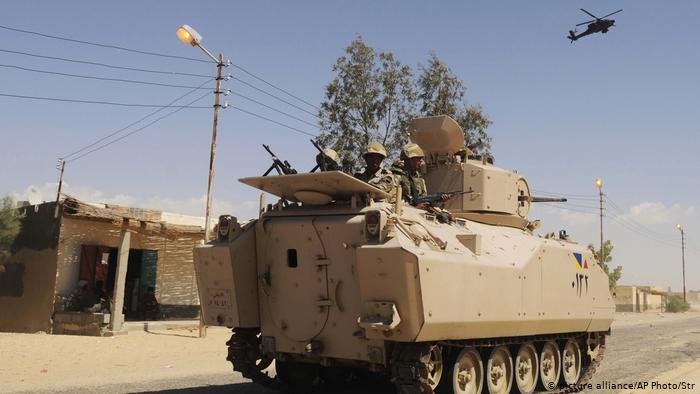
A suspected dissident and deserter from the IS-affiliated Sinai Province has accused the group of carrying out the deadly attack against Rawda mosque last year, after joining the rival Al-Qaeda inspired militia Jund al-Islam.
The alleged dissident made the claims in recently released video footage, a move that comes as part of a media war between the two Sinai-based militant groups.
The footage, titled ‘Excuse your lord’, shows a sole dissident who allegedly fled from Sinai Province’ to join Jund al-Islam.
The dissident, who appears anonymously, noted that 10 militants from Sinai Province based inside the city of al-Arish executed the attack against the worshipers at Rawda mosque, killing over 300 people, the deadliest terrorist attack in to occur in Egypt.

“They did not say it clearly among the members of the Sinai Province, however there were leaks from the Al-Arish branch that reached ‘El-Fetat’ branch located in Sheikh Zewaid city. These leaks show the responsibility of ‘Sinai Province’ for the attack,” the dissent says.
Internal media channels inside areas subjected to the authority of Sinai Province also broadcast that the 10 militants killed 305 people inside Rawada mosque and seized from them weapons, he added.
“The attack was met with welcome from prominent figures in Sinai Province including Abu Hany El Sharei and Selim El Hamdyeen,” he said.
Fugitives from ‘Sinai Province’
The dissident said that at least 40 people have escaped from Sinai Province within the last month.
“The last batch of dissidents from Sinai Province included seven members including myself — the Sinai Province security apparatus foiled it and I was subjected to investigations and imprisonment — I spent nearly 20 days in jail and I was beaten on a daily basis,” he said.
The organizational structure of Sinai Province
The dissident explained that the group is being administrated by a ‘Shura [consultations] Council’ that consists of 10 figures who are controlling the group. Then the authority goes to a judiciary official named Mohamed Saad El Sedidi who is from Ras Sedr city in South Sinai — this official was the responsible for legitimizing the attack against ‘Rawda’ mosque, according to the dissident.
He further stressed that there is no access to media outlets including televisions or internet networks for militants inside Sinai Province, noting that members of the group are only subjected to media messages prepared and scheduled to be broadcast by the group’s administrative council.
Sinai Province relations with Hamas
Sinai Province recently released footage threatening the Gaza strip-based Hamas, who administer the enclave, and accused the group of being apostates. It also decapitated a Sinai Province militant over charges that they were smuggling weapons to Hamas.
The dissident also noted that the group decided to decapitate Mousa Abo Zomat on charges of espionage for Hamas. However, the verdict issued against Zomat was a shock to all members as he was considered to be one of the oldest members living with the group, he stressed.
“The main aim of broadcasting such video footage was to send a message to Hamas that it is an apostate movement and to also attract all Hamas members who are considering turning against it — the perpetrators of the attack were all Palestinians from the Gaza strip,” he said.

Reasons for dispute between ‘Sinai Province’ & ‘Jund al-Islām’
In November 2017, the little-known militant group of Jund al-Islām, inspired by Al-Qaeda ideology, declared that it carried out a military attack against Sinai Province, describing the group as ‘Kharijites,’ or apostates.
Through a voice statement, Jund al-Islam explained that the Sinai Province is violating Islamic Sharia law because it targets civilians and brands them as apostates.
Jund al-Islam caught Egyptian media attention in 2013 when it claimed responsibility for the bombings that targeted the facilities of the Egyptian Military Intelligence located in the North Sinai city of Rafah.
At that time, the group was emerging as a militant organization that subscribed to the ideology of Al-Qaeda, which differs to that of IS.
Disputes erupted between Jund al-Islam and the Ansar Bayt al-Maqdis group, currently known as Sinai Province, when the latter pledged allegiance to IS and its leader Abu Bakr al-Baghdadi in November 2014.
Jund al-Islam objects to what it considers the excessive killings carried by IS and the Sinai Province against civilians. Instead, the group prioritizes the targeting of military officers.




